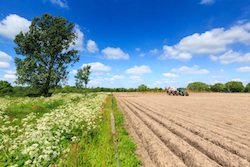New approaches to rural land management
Rural land serves a wide range of functions and provides a number of services on which society depends. For example, as well as being vital to the production of food, fibre, timber and energy, rural land also plays a major role in climate regulation, biodiversity, water quality, soil functionality, flood management, cultural landscapes and recreation. Unfortunately, these environmental and social benefits are undervalued in the land management decisions being made by the EU’s agriculture and forestry sectors. To change this, the EU-funded PEGASUS project looked to transform our approach to agriculture, forestry and rural land management. “The project aimed to assess and stimulate a more wide-ranging and long-lasting provision of environmental and social benefits from agriculture and forestry in the EU,” says Project Manager Anne Maréchal. Involving stakeholders for a bigger impact To ensure a long-lasting impact, the project took a holistic approach. This meant exploring the full complexity of the factors enabling and limiting the joint delivery of economic, social and environmental outcomes in rural areas. This was accomplished by conducting 34 case studies in different farming and forest systems using a participatory, or action-research, approach. Each case study was heavily stakeholder orientated and relied on a long-term engagement and exchange with farmers, land managers, rural actors and local policymakers. Thanks to active stakeholder participation, researchers were able to consider all the cultural, social, political, institutional and governance factors that influence and motivate what actually happens on the ground. “This gave us an understanding of how public policy and private initiatives can operate and evolve to best enhance the synergies between the production of food and timber and environmental and social outcomes,” says Maréchal. From findings to policy recommendations These findings were then used to inform a series of policy recommendations on how the provision of environmental and social benefits by agriculture and forestry could be enhanced. These recommendations include increasing funding for collaborative/cooperative action, as well as for advice, knowledge-sharing and facilitation; designing and implementing a mix of well-targeted, flexible and coherent measures; and strengthening the links with the private sector. “The PEGASUS policy recommendations highlight the importance of providing support to and encouraging a variety of actors, institutions and value chains to agree on priorities and then cooperate on joint actions across a territory or along a supply chain,” says Maréchal. The project also developed a toolkit that provides practical guidance and useful tips to stakeholders. “The toolkit provides a new and accessible resource for stakeholders who wish to start a collaborative initiative for delivering more Public Goods/Ecosystem Services (PG/ESS) from agriculture and/or forestry,” says Maréchal. A mapping add-on to the toolkit helps these initiatives better understand and benchmark the state of the provision of environmental and social benefits in their region. A community of stakeholders With the active participation of stakeholders being an integral part of the project’s methodological approach, it’s no surprise that one of the project’s legacies is the community of stakeholders it leaves behind. “The active engagement of a wide-range of stakeholders via our action research approach supported the development of local knowledge and understanding,” adds Maréchal. “It is my hope that this legacy of co-learning, networking and connections will live on beyond the lifetime of the project.”
Keywords
PEGASUS, agriculture, forestry, sustainability, land management, rural

